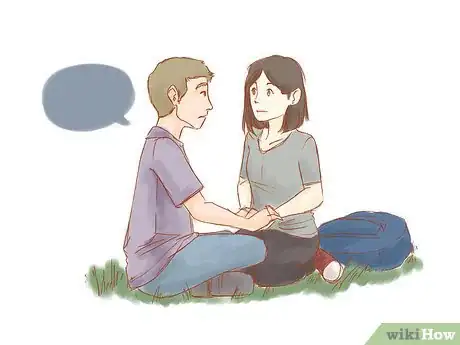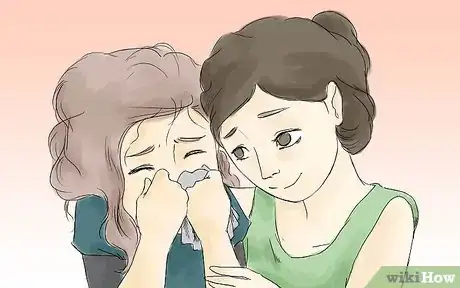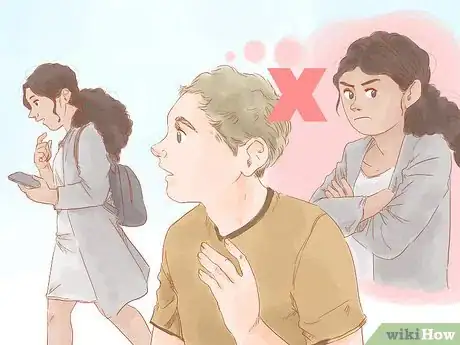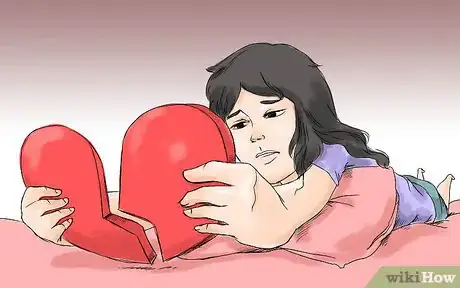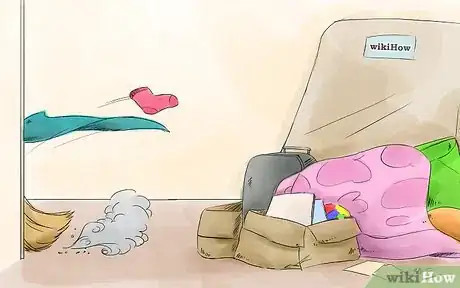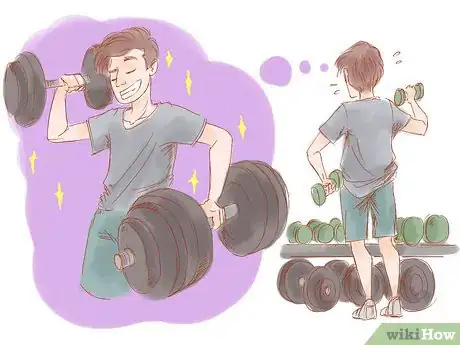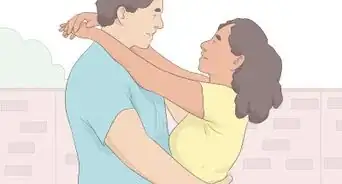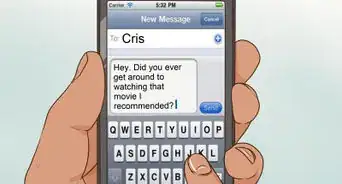This article was co-authored by Philip Glickman, PsyD. Dr. Philip Glickman is a Licensed Clinical Psychologist and the Director of Wellness Road Psychology with two locations in Dobbs Ferry and the Financial District of New York City. He specializes in cognitive-behavioral therapy, mindfulness techniques, treatment of anxiety, and life coaching. Dr. Glickman is a member of the American Psychological Association. He holds a BA in Criminology and Psychology from The University of Maryland College Park and an MA in Forensic Psychology from The City University of New York. Dr. Glickman also holds a PsyD in School and Community Psychology from Hofstra University.
There are 12 references cited in this article, which can be found at the bottom of the page.
This article has been viewed 59,132 times.
So, you've been dumped. Whether this is your first time or your twentieth time, you're probably experiencing some intense, conflicting emotions right now. Frustration, sadness, anger, and even happiness or relief are all natural reactions to a breakup. Getting through these difficult emotions is a matter of practicing responsible habits right after the breakup and taking positive steps toward moving on in the long term.
Steps
Handling a Breakup
-
1Get closure (if you haven't already gotten it).[1] If you've already had a long, honest conversation with your ex about why you've been dumped, you can skip this step. If not, try to get in contact with your ex one last time. It's hard to move on following a breakup if you don't fully understand the reasons it happened in the first place. Listen carefully to your ex's explanation for dumping you. Even if you think s/he is being unreasonable, it's important to know your ex's thought process. Offer your own thoughts about the relationship as well, doing your best to avoid unhelpful insults or cruel remarks.
- If your ex won't talk with you or is too emotional to discuss the breakup rationally, back off. Forcing the topic can cause tempers to flare. If you're brave, you can try asking your ex's friends for an explanation.
-
2Accept the negative feelings that can come with rejection. For most people, getting dumped can lead to sadness and/or anger even if it was obvious that the relationship was not going well. Acknowledge these emotions. Let yourself cry, punch a pillow, or rant to a friend. Do whatever you need to do to "let it all out." Getting past a breakup is a little like losing a friend or family member. You need adequate time to grieve before healing can begin.[2]
- Remember: all emotions are temporary. You might feel bad right now, but by accepting your emotions you take the most important step to recovery. Time will greatly reduce your pain, but only once you accept that you are hurting in the first place.
- For each negative feeling you have, try to think of 3 positive things about yourself to help you feel better.[3]
Advertisement -
3If it makes you feel better, indulge yourself a little. It's practically cliche that people who are dumped will "let themselves go" for a brief while, but this cliche exists for a reason. Giving yourself reasonable treats after a breakup can make managing your emotional pain easier and help you feel valued. You might, for instance, try enjoying your favorite dessert after dinner for a few days after your breakup. Alternatively, try dedicating a day off purely to the hobbies you haven't had time for lately.[4]
- Note that bad habits that are dangerous should not be indulged. Don't use drugs or alcohol to dull the emotional pain you're feeling. Don't turn to reckless behavior for an emotional "high." These things do nothing to address the root cause of your pain and can put you in very dangerous situations.
-
4Talk to members of your social support network. You're never alone after a breakup. Don't be afraid to vent to your family and close friends if you're feeling sad or frustrated. Simply talking about your problems can have a calming effect and make them seem much more manageable. You may also be surprised by how knowledgeable the people you talk to are. If they've been through breakups in the past, they may have valuable advice.[5]
- While friends and family members can be a big help, never, ever be afraid to talk to a professional if you don't start to feel better after a week or two. Counselors and therapists can help you work through issues that are affecting your ability to work, study, or enjoy your life. This sort of help isn't just for "crazy" people — more than a fifth of Americans have seen a therapist.
-
5Avoid contact with your ex for the time being. Breaking up with someone doesn't mean that you never have to see this person again. However, if you can, you'll want to minimize the time you spend together for a while simply to avoid sparking old grudges or arguments. Everyone gets past a breakup at a different pace, so take as much time away from your ex as you need until the idea of talking to this person doesn't make you feel tense or angry. About one month is enough for many people, but longer is fine.[6]
- If you're forced to interact with your ex (like, for example, if you are stuck doing a project together for school), keep your conversations short and polite. Don't talk about your relationship. Just say what needs to be said to get through whatever you're doing. Be pleasant, but not overly friendly.
-
6Take the opportunity to learn from your breakup. As hard as a breakup may seem, there is almost always a silver lining. Breakups are great learning experiences for future relationships.[7] They give you a chance to reflect on what went wrong and why. They allow you to grow as a person and change the way that you handle your relationships. Even if you did nothing wrong, you can still learn which traits to avoid in your next partner. Try pondering the following questions:
- Why did the relationship end? Were there problems in our communication? Was I not being treated the way I deserved? Did I treat my partner unfairly?
- Whose fault was it? Mine? My partner's? Both of ours?
- What things about my partner did I dislike? What things did I like?
- What things about myself made the relationship less likely to succeed?
Moving On
-
1Get rid of reminders of your relationship. Thinking about your ex more than you have to will prolong the healing process. To help get your mind off of this person, remove reminders from your daily life. For example, get rid of pictures of this person — whether they're on your desk, your phone, or your computer. If your ex gave you any mementos or presents, consider throwing them away. If they are valuable and you'd like to keep them, box them up and put them somewhere out of the way for at least a few months.
- You'll also want to remove your ex from your social media. Consider blocking your ex, or removing him or her from your friends list. Change your profile picture if your current one shows the two of you together. You can also take a break from social media altogether if you frequently see posts from this person's friends.
-
2Focus on yourself. Being single can be hard at first, but one bright side is that you now have more time to spend on yourself. Use your extra time to improve yourself any way you wish.[8] Try picking up a new hobby or revisiting one you didn't have time for before. You can also try teaching yourself a new skill, learning a new language, or anything else that you consider constructive.[9]
- This sort of self-improvement has the added benefit of making you more attractive to potential partners when you do jump back into the dating pool.
-
3Get some physical exercise. Exercise is one of the absolute best things you can do for yourself following a breakup.[10] An ambitious new workout routine can help you look your best, boosting your self confidence and making you more attractive to others.[11] In addition, exercise can have a positive effect on your mood — it's often one of the first things doctors prescribe for depression.[12]
- See our exercise article for specific workout tips. With simple changes to your diet and physical routines, you can make a major transformation in as little as two months.
-
4Be comfortable as a single person before you enter another relationship. Ironically, you shouldn't jump back into another serious relationship until you're confident that you don't need one to be happy. In other words, make sure that you're happy and secure on your own before you start a new relationship.[13] You need to be able to love yourself before you can love someone else. Using a new relationship to fill the hole in your heart from an old one isn't fair to yourself or your new partner. It can easily be a recipe for future heartbreak.[14]
- While some couples manage to get back together after a breakup, be wary of starting a new relationship with your ex. This is especially true if it was your ex's behavior or infidelity that led to the collapse of your relationship in the first place. You should look for concrete proof that this person has made changes in his or her life before you even consider getting back together.
Expert Q&A
-
QuestionHow long does it take to get over being dumped?
 Philip Glickman, PsyDDr. Philip Glickman is a Licensed Clinical Psychologist and the Director of Wellness Road Psychology with two locations in Dobbs Ferry and the Financial District of New York City. He specializes in cognitive-behavioral therapy, mindfulness techniques, treatment of anxiety, and life coaching. Dr. Glickman is a member of the American Psychological Association. He holds a BA in Criminology and Psychology from The University of Maryland College Park and an MA in Forensic Psychology from The City University of New York. Dr. Glickman also holds a PsyD in School and Community Psychology from Hofstra University.
Philip Glickman, PsyDDr. Philip Glickman is a Licensed Clinical Psychologist and the Director of Wellness Road Psychology with two locations in Dobbs Ferry and the Financial District of New York City. He specializes in cognitive-behavioral therapy, mindfulness techniques, treatment of anxiety, and life coaching. Dr. Glickman is a member of the American Psychological Association. He holds a BA in Criminology and Psychology from The University of Maryland College Park and an MA in Forensic Psychology from The City University of New York. Dr. Glickman also holds a PsyD in School and Community Psychology from Hofstra University.
Licensed Clinical Psychologist I believe that if you've been dating for a month, you should give yourself at least a month. If you've been dating for six months, give yourself self at least six months before entering back into a serious relationship. That doesn't mean you can't date at all but you don't want to jump into something super serious right away because you're still kind of processing and recovering from what's called attachment trauma.
I believe that if you've been dating for a month, you should give yourself at least a month. If you've been dating for six months, give yourself self at least six months before entering back into a serious relationship. That doesn't mean you can't date at all but you don't want to jump into something super serious right away because you're still kind of processing and recovering from what's called attachment trauma. -
QuestionHow do you heal yourself after a break up?
 Philip Glickman, PsyDDr. Philip Glickman is a Licensed Clinical Psychologist and the Director of Wellness Road Psychology with two locations in Dobbs Ferry and the Financial District of New York City. He specializes in cognitive-behavioral therapy, mindfulness techniques, treatment of anxiety, and life coaching. Dr. Glickman is a member of the American Psychological Association. He holds a BA in Criminology and Psychology from The University of Maryland College Park and an MA in Forensic Psychology from The City University of New York. Dr. Glickman also holds a PsyD in School and Community Psychology from Hofstra University.
Philip Glickman, PsyDDr. Philip Glickman is a Licensed Clinical Psychologist and the Director of Wellness Road Psychology with two locations in Dobbs Ferry and the Financial District of New York City. He specializes in cognitive-behavioral therapy, mindfulness techniques, treatment of anxiety, and life coaching. Dr. Glickman is a member of the American Psychological Association. He holds a BA in Criminology and Psychology from The University of Maryland College Park and an MA in Forensic Psychology from The City University of New York. Dr. Glickman also holds a PsyD in School and Community Psychology from Hofstra University.
Licensed Clinical Psychologist Try "dating yourself"! Travel by yourself, do some exercises, read a few books. You could also focus on your career or your education. The idea is to feel better by yourself, without focusing on getting hitched again right away.
Try "dating yourself"! Travel by yourself, do some exercises, read a few books. You could also focus on your career or your education. The idea is to feel better by yourself, without focusing on getting hitched again right away.
References
- ↑ https://www.elitedaily.com/p/how-to-get-closure-after-a-breakup-move-on-even-if-years-have-gone-by-9729303
- ↑ https://www.helpguide.org/articles/grief/dealing-with-a-breakup-or-divorce.htm/
- ↑ Philip Glickman, PsyD. Licensed Clinical Psychologist. Expert Interview. 19 August 2021.
- ↑ https://www.mindbodygreen.com/0-7610/17-ways-to-take-care-of-yourself-after-a-breakup.html
- ↑ https://www.psychologytoday.com/us/blog/beyond-the-psychology-major/201705/how-let-go-after-your-breakup
- ↑ https://www.psychologytoday.com/us/blog/having-sex-wanting-intimacy/201612/4-reasons-stay-out-contact-your-ex
- ↑ https://www.lifehack.org/articles/communication/12-important-life-lessons-ive-learnt-after-break.html
- ↑ Philip Glickman, PsyD. Licensed Clinical Psychologist. Expert Interview. 19 August 2021.
- ↑ https://www.insider.com/best-thing-to-do-to-get-over-an-ex-break-up-2017-8
- ↑ https://www.askmen.com/dating/dating_advice/why-you-should-work-out-after-a-breakup.html
- ↑ Philip Glickman, PsyD. Licensed Clinical Psychologist. Expert Interview. 19 August 2021.
- ↑ http://www.webmd.com/depression/guide/exercise-depression
- ↑ Philip Glickman, PsyD. Licensed Clinical Psychologist. Expert Interview. 19 August 2021.
- ↑ https://www.psychologytoday.com/us/blog/having-sex-wanting-intimacy/201307/5-steps-take-starting-new-relationship
- ↑ https://www.lifehack.org/articles/communication/how-practice-forgiveness-and-happier.html
